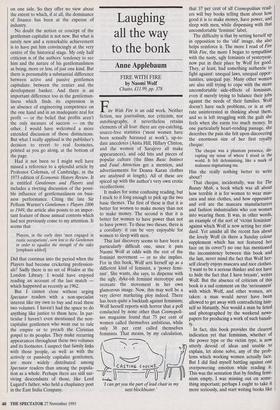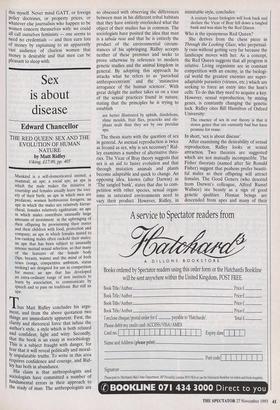Laughing all the way to the bank
Anne Applebaum
FIRE WITH FIRE by Naomi Wolf Chatto, L. 11.99, pp. 378 Fire With Fire is an odd work. Neither fiction, nor journalism, nor criticism, nor autobiography, it nevertheless retains elements of all four: there are eye-catching, source-free statistics (`most women have been sexually harassed at work'), up-to- date anecdotes (Anita Hill, Hillary Clinton, and the women of Sarajevo all make appearances), and odd bits and pieces of popular culture (the films Basic Instinct and Fatal Attraction get a mention, and advertisements for Donna Karan clothes are analysed at length). All of these are spiced up with the author's very own erotic recollections.
It makes for some confusing reading, but I stuck to it long enough to pick up the two basic themes. The first of these is that it is better for women to make money than not to make money. The second is that it is better for women to have power than not to have power. To these two theses, there is a corollary: it can be very enjoyable for women to sleep with men.
This last discovery seems to have been a particularly difficult one, since it puts Naomi Wolf at odds with the rest of the feminist movement — or so she implies. For in this book, Wolf sets herself up as a different kind of feminist, a 'power femi- nist'. She wants, she says, to dispense with the ugly, dyke-ish feminist stereotype and recreate the movement in her own glamorous image. Now, this may well be a very clever marketing ploy indeed. There has been quite a backlash against feminism; Wolf herself reports with horror that a poll conducted by none other than Cosmopoli- tan magazine found that 75 per cent of women called themselves ambitious, while only 38 per cent called themselves feminists. That means, by my calculation, can get you the part of lead chair in my next blockbuster.' that 37 per cent of all Cosmopolitan read- ers will buy books telling them about how good it is to make money, have power, and sleep with men, while dispensing with that uncomfortable 'feminist' label.
The difficulty is that by setting herself up in opposition to the 'old' image, she also helps reinforce it. The more I read of Fire With Fire, the more I began to sympathise with the nasty, ugly feminists of yesteryear, now put in their place by Wolf for good. They, at least, had something authentic to fight against: unequal laws, unequal oppor- tunities, unequal pay. Many other women are also still trying to cope with the more uncomfortable side-effects of feminism, even if merely trying to balance their jobs against the needs of their families. Wolf doesn't have such problems, or is at any rate uninterested in thinking about them, and so is left struggling with the guilt she feels when she earns too much money. In one particularly heart-rending passage, she describes the pain she felt upon discovering the enormous size of her first royalty cheque:
The cheque was a phantom presence, dis- rupting my sense of where I stood in the world. It felt defeminising, like a mark of maleness stigmatising me.
Has she really nothing better to write about?
That cheque, incidentally, was for The Beauty Myth, a book which was all about how terrible it is for women to wear mas- cara and nice clothes, and how oppressive and evil are the mascara manufacturers and fashion industrialists who con women into wearing them. It was, in other words, an example of the sort of 'victim feminism' against which Wolf is now setting her stan- dard. Yet amidst all the recent fuss about the lovely Wolf (is there a Sunday colour supplement which has not featured her face on its cover?) no one has mentioned the inconsistency between this book and the last, never mind the fact that Wolf her- self clearly enjoys mascara and nice clothes. `I want to be a serious thinker and not have to hide the fact that I have breasts', writes Wolf. But the absence of criticism of this book is a sad comment on the 'seriousness' with which Wolf, and other women, are taken: a man would never have been allowed to get away with contradicting him- self so blatantly. Nor would a man be feted and photographed by the weekend news- papers for producing a work of such banali-
tY. In fact, this book provides the clearest indication yet that feminism, whether of the power type or the victim type, is now utterly devoid of ideas and unable to explain, let alone solve, any of the prob- lems which working women actually face. But I did find myself battling against one overpowering emotion while reading it. This was the sensation that by finding femi- nism empty, I was missing out on some- thing important; perhaps I ought to take it more seriously, and start writing books like this myself. Never mind GATT, or foreign policy doctrines, or property prices, or whatever else journalists who happen to be women concern themselves with: we could all call ourselves feminists — one seems to need no credentials — and then earn lots of money by explaining to an apparently vast audience of clueless women that money is desirable and that men can be pleasant to sleep with.











































































 Previous page
Previous page